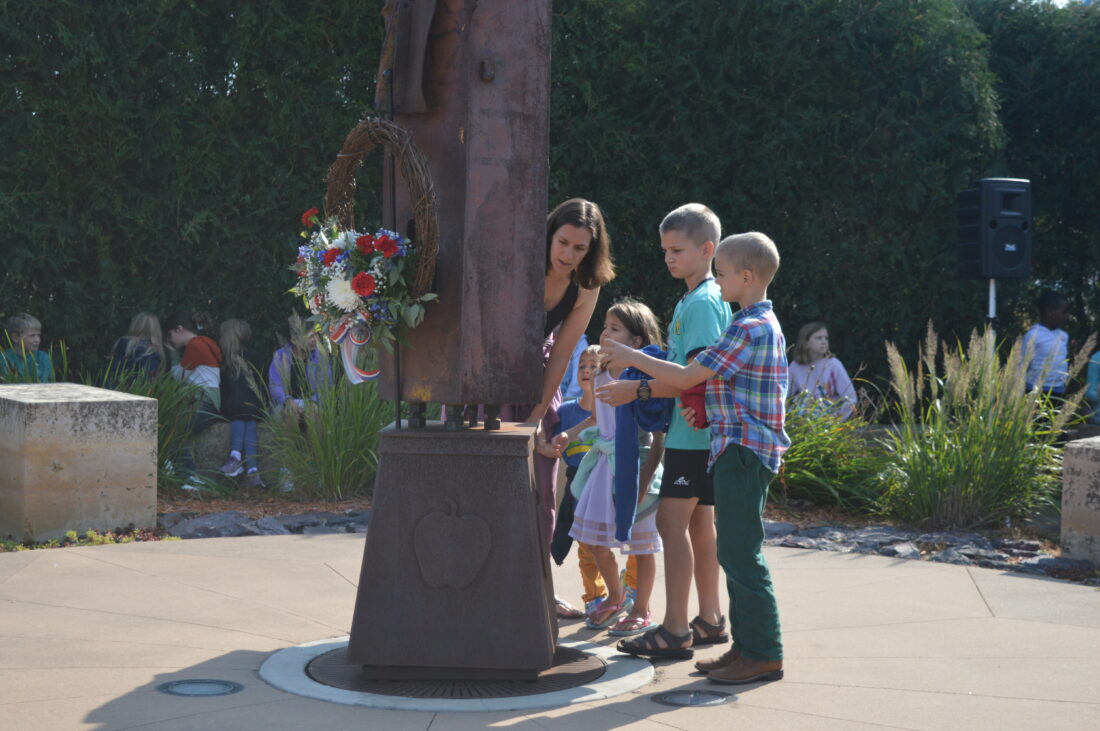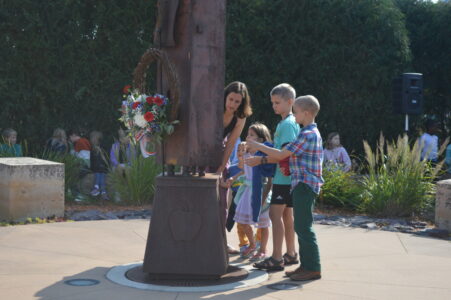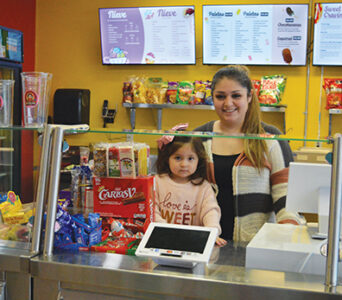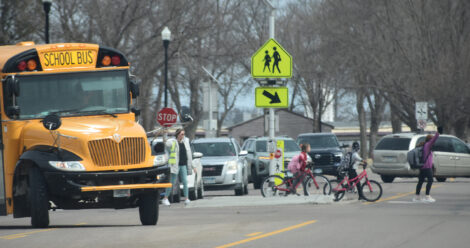A life-changing day
Speakers reflect on impact of 9/11 at memorial program

Community members got a closer look at the piece of beam from the World Trade Center that forms the center of the 9/11 memorial in Marshall. The city held a remembrance program Thursday morning at Memorial Park.
MARSHALL — Hearing about the terror attacks of September 11, 2001, was a memory that state Sen. Jeff Howe said will always stay with him.
“This is one of those events in a lot of our lifetimes where everyone knows exactly what they were doing and where they were,” said Howe, R-Rockville. “I was actually driving on Highway 23 on my way to work. In fact, I can tell you I was just past County Road 6, almost to I-94, when I heard on the radio that a plane went into the World Trade Center.”
Howe, the keynote speaker at Thursday’s 9/11 memorial program in Marshall, said that moment led to big changes both in the world and his own life.
“It brings more light to what we should be not only celebrating on this great country, but what we should really take home, and how our society needs to heal,” Howe said of the response to 9/11.
Community members gathered in Memorial Park on Thursday morning to remember the terror attacks and the lives lost on 9/11. The crowd included both adults and children from local schools. Marshall Mayor Bob Byrnes encouraged young people to stay after the program to walk around in Memorial Park and learn more about the 9/11 memorial.
Speakers including Rev. Greg Pavek, pastor at Living Word Lutheran Church in Marshall, reflected on their experiences on September 11, 2001, and afterward.
“I was in the fourth grade when the 9/11 attacks took place. We didn’t have a television in our classroom, so my teacher held up a radio and we listened to the news reports,” Pavek said. “I remember feeling a lot of emotions. There was a lot of confusion, there was a lot of fear . . . But even from a thousand miles away, I can’t imagine the fear and the confusion that were on (the Twin Towers) site.”
In spite of the fear and confusion of the terror attacks, there were still men and women who made incredible sacrifices to try and save others, Pavek said.
“Even now, many years later, it can bring a sense of patriotism, alongside a different type of fear and confusion as we think about those events, because we still live in a broken world,” Pavek said.
Howe’s keynote address reflected on the many ways the world changed after 9/11. Howe has served in both the Minnesota Senate and House, but he also served in the U.S. military. Howe first served in the Navy as an avionics technician, and was deployed to Iran during the Iranian hostage crisis. He later served two tours in Iraq with the Minnesota Army National Guard.
Howe said he remembered not only hearing the news about the World Trade Center attacks on the radio, but watching the news on TV when he arrived at work.
“We were watching the tower burn, when we watched, at 8:03, the second plane go in,” he said. “At that moment, I knew our nation was under attack . . . I didn’t know then how much this was going to affect my life.”
Howe ended up taking 250 troops to Iraq in the years following 9/11. “I couldn’t be more honored to have served with a bunch of young men and women that did outstanding work and surprised me,” he said. “I have the same belief that the young men and women standing here today will rise to that occasion again.”
A lot of things in everyday life changed after 9/11, Howe said. One example was the increased security at places like airports. But there were other, positive ways people changed, he said.
“I don’t know if you remember, but after 9/11, those of us who were alive, you remember how the nation came together?” Howe asked the audience. “We were all ready to do what was right for our nation. Where did that go? What happened?”
Howe urged the audience to try to show the same readiness to do the right thing. He said the question that should stay on people’s minds into the future was “Where can I help?”
“Maybe we should take a little bit of a look at these folks that are walking around that look a little odd. Maybe we should talk to them,” he said. “Maybe just asking how you can help them, will make a difference.”



